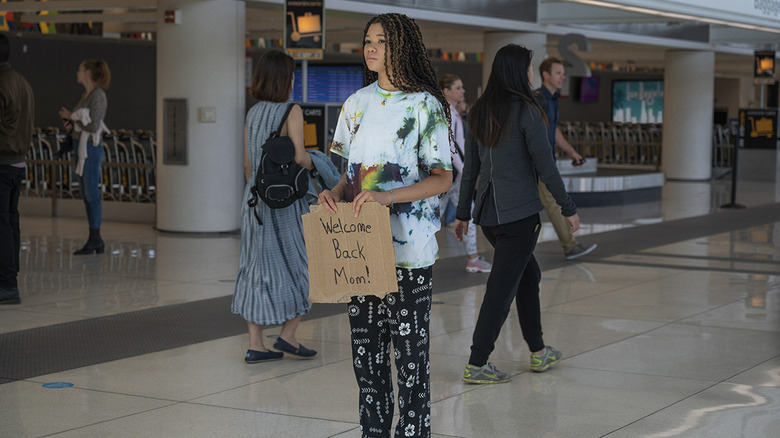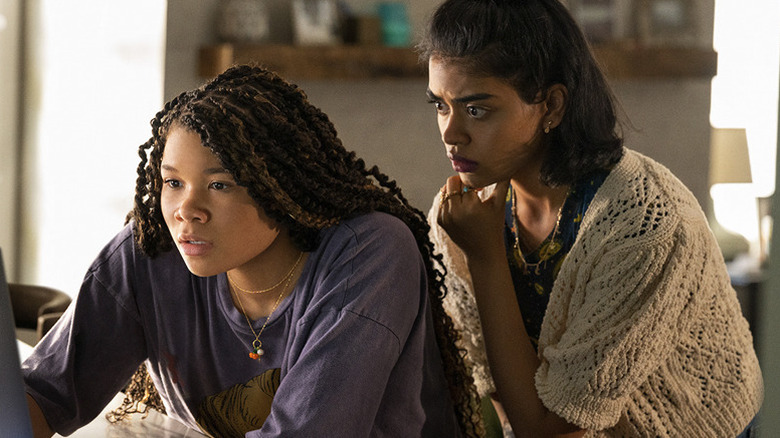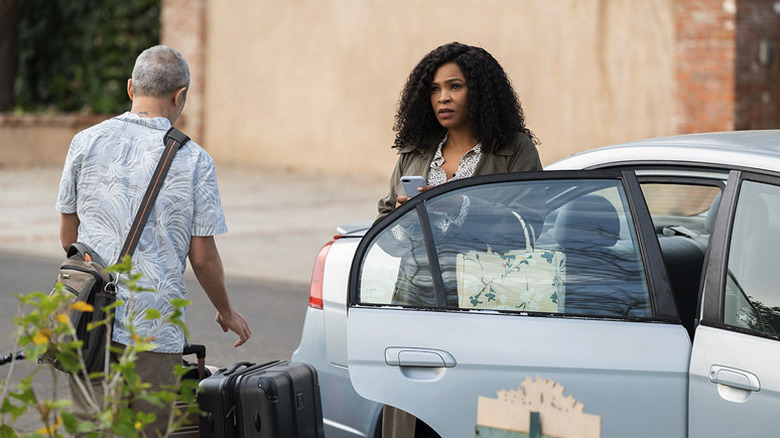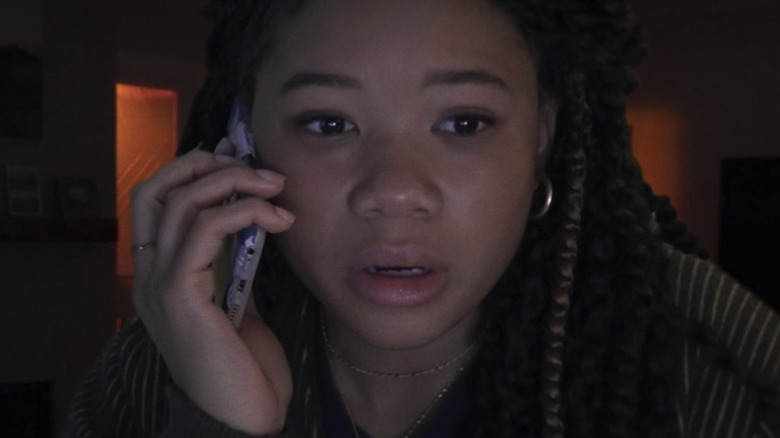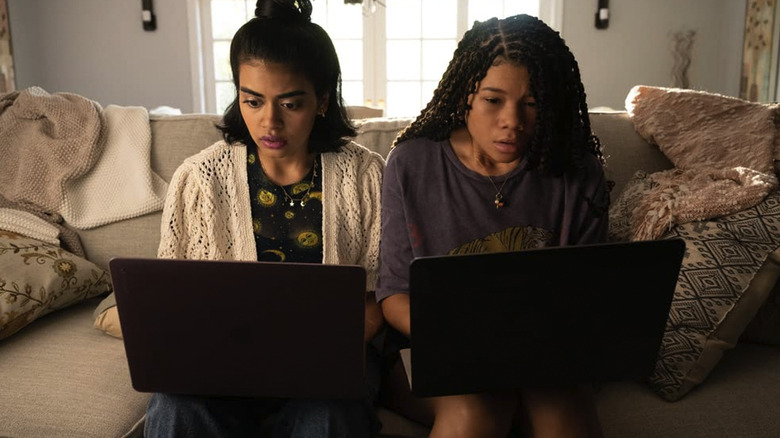Missing Filmmakers On Their Searching Sequel, Going International, And The Alien Subplot [Exclusive Interview]
This post contains spoilers for "Missing."
"Missing," the sequel to 2018's Screenlife movie "Searching," is in theaters now, and while this follow-up is perhaps not quite as electrifying as the first movie since the format has become a bit more familiar to audiences, it's still a wildly entertaining and twisty thrill ride that keeps the audience guessing and expands the scope of this franchise in fascinating ways. The filmmaking team behind the first movie have all returned for "Missing," albeit in a shuffled capacity. On "Searching," Aneesh Chaganty served as co-writer and director; Sev Ohanian was a co-writer and producer; Natalie Qasabian was a producer, and Will Merrick and Nick Johnson served as editors and "directors of screen photography," having generated every digital asset in the movie from scratch.
For "Missing," Chaganty and Ohanian have "story by" credit, Ohanian and Qasabian returned as producers, and Merrick and Johnson wrote the script and teamed up as directors. I jumped on a Zoom call with all of them in the days leading up to the movie's release and they told me about what projects inspired them this time around, the logistical challenges they had to overcome, the film's commentary on the true crime genre, how its alien invasion subplot evolves in the sequel (yes, really), and more.
Note: This interview has been lightly edited for clarity and brevity.
'If the first Searching was Sam Raimi's Spider-Man, we wanted this to be Spider-Verse'
For Nick and Will, I know how hard you two worked editing "Searching" and creating a lot of what we saw in that film from scratch. What was the appeal for you guys of returning to that same world for your feature directorial debut, since you spent so much time embedded in it the first time around?
Johnson: Well, first of all, we love the format. Even as exhausted as we were after it was done, we love the format because we spent so much time developing the language of it. We felt — it's like our baby.
We definitely felt like there was more visual stuff that we left on the table that we wanted to play with. And also, I have this distinct memory when I was editing "Searching" where I was like, "Man, I'm never going to be able to work on something with this much creative control in the editing process." I'm not an animator. I'm not going to go make — literally be animating a Pixar movie in the future. To be able to have an idea for a camera move or a mouse movement or something fun to put in the background is such a great experience. And I really, in the moment, remember thinking, "I'm going to miss this," genuinely thinking, "I'll never ever do this again. This is a horribly painful process."
But then when we got the opportunity to do it, it was honestly a privilege to work on it again, because it really is fun to polish something on that level.
I remember the previous movie used detective stories and things like "Gone Girl" as influences. So for Nick and Will, what were you guys looking at for inspiration in the lead up to making this one?
Merrick: Yeah, I think there may be another "Gone Girl" shout-out buried somewhere in this one as well. That was a big one. We talked a lot about how if the first "Searching" was Sam Raimi's "Spider-Man," we wanted this to be "Spider-Verse." We looked at all the classic missing person stories. We looked at social media information. But as far as the idea of a child looking for their parent, I don't think we ever found any comps. So really, a lot of the same influence as "Searching," plus "Spider-Verse" and Edgar Wright, I would say.
Johnson: And Google and Facebook commercials, and even "Succession." The way that the camera punches in through scenes. There's a little bit more of those camera punch-ins.
Merrick: The documentary camera.
Johnson: Yeah, a lot of documentaries. Scenes from "Home Alone." Just everything.
'It's making a whole live-action movie and a whole animated movie and trying to merge those two workflows together'
For Aneesh and Sev, I know you guys have story credit on this one. But I believe this is the first time that you've worked as writers on something that you didn't direct. Did it feel strange to take more of a backseat for this one in that regard?
Chaganty: No, I loved it. It was the first time I was on set and didn't feel stress. It was just nice to see, because directors don't get to see other people direct. I got to see the things that they do better, the things that we all do the same. It was a very refreshing experience for me.
It's a totally different POV that I have than Sev and Nat, who are career producers. So there was a little bit of, "Wow, I have a Fast Pass and I'm going down this line really quickly" feeling to it. But yeah. It was really fun to watch the movie get made, and then a movie get made at all from that POV.
Merrick: Aneesh was a great producer on this movie. Filled the role of producer really well. And I love that you went from working with us as your editors to when we were directing, your mind goes, "This is so great. I get to see how other directors work." Rather than just [dismissively], "Ah, these guys." That's learning from everything.
Chaganty: That's the public line. That's what I'm saying to press. [laughs]
So Natalie, the international component here automatically makes this movie feel bigger than "Searching," which already felt surprisingly huge given the stylistic restraints of that film. From a producing standpoint, what were the biggest challenges that you had to overcome this time around?
Qasabian: Yeah, just overall, the whole thing. I think Sev and Aneesh came to this as writers of the treatment being like, "How do we make this bigger and better?" And one of the ways was, "Let's go global." So that introduced a whole logistical thing there.
But really it's the sheer volume of stuff in this movie. There's more characters, there's more assets, the editing feels like it's sometimes five times quicker than "Searching." And like the first movie, none of it is screen recorded. So it's all done from scratch. All the assets you're seeing are original that we captured. So it's just a big, honestly, logistical matrix. It's making a whole live-action movie and a whole animated movie and trying to merge those two workflows together.
Johnson: Just to add to that, with the international aspect. So much of the movie really depends on the relationship between June and Javi, this unlikely hero in Colombia who's a retired TaskRabbit guy. And to really make that work, because there are scenes where June is up in the middle of the night in L.A. while he's running around the streets of Cartagena, we really put a lot of time and effort into making sure the two actors could meet in person in L.A. Storm was so kind. She would be up in the middle of the night in L.A. so that she could be live recording opposite Javi just to even have a voice on the phone.
Qasabian: And Joaquim [de Almeida], who plays Javi, who doesn't even appear, obviously, in any of the scenes set in L.A., he actually came to set for a lot of the days when Storm was acting opposite him so he could be in the corner reading off camera. And that was really Will and Nick pushing to make sure they would get time as actors.
Merrick: It was huge that that was possible with the AD department, and then you guys making a million calls to the actors and their agents to make it happen.
I was going to ask about those two actors in particular, because they really do feel like the soul of the movie. Did you have them in mind straight off? How did you find them? How did that work?
Johnson: Yeah, so first of all, we got the treatment around when the pandemic started. And around when the pandemic started, "The Invisible Man" came out. And I remember watching "Invisible Man" just because we were interested in watching the movie, but also Storm was in that, and thinking, "Damn, this girl's really good in this smaller role." We were familiar with Storm, so she was always on the list of actresses, and we talked with a bunch of different actresses, but I would say that there was always this interest. "If Storm wanted to do it, we believe she can carry a movie." And when we talked to her and she was interested in it, that was a no-brainer for us. We were really excited. Then we started to craft the movie around her.
In terms of Joaquim, I love "24" and that's something that ... I know, Sev, you love "24," too. I love "24," and I was always familiar with Joaquim in "Desperado," and he's just a great actor.
When we saw our casting director, Lindsay Weissmueller, who's amazing and who managed to give us the best cast first-time directors could ever possibly ask for, she had him on a list and it was like, "Holy crap. I've never seen him in a role like this. He's really this tough guy villain." So that was really exciting to us, to see a different version of Joaquim. And we're really lucky he said yes, because honestly, I think he's a treasure and he's a really great actor, and it was a pleasure to see him work.
'There were so many ideas that were completely different'
I'm curious about the evolution of this project. What were some early ideas that didn't end up making it into the final cut? And feel free to talk about spoilers.
Merrick: There are going to be deleted scenes on the Blu-ray, which is really fun.
The overall story stayed mostly the same from script to final. There was a sequence, for instance, early in the movie when [June is] going down this rabbit hole, Googling how dangerous of a situation her mom might be in, where she watches all these videos on a website called One Patrol that's based on Citizen of people being kidnapped or people being robbed. And we realized you just don't need that, for instance. Sev, what were you thinking?
Ohanian: Yeah, I was going to say even earlier than that. When the studio first came to us with the ask to make a sequel, I remember Aneesh, Natalie, and I were in my office, quite literally on a whiteboard writing what are the core tenets of this movie? Is this going to be family-oriented? Theme of connection. Obviously, twists.
When we started landing on this idea of international. I remember early on it was like, "Well, how do we create stakes for the character? Obviously, she's going to be in L.A. while all the danger is elsewhere." There was a lot of times where I remember in the early days of writing this treatment, Aneesh and I. We were like, "Is the midpoint that she's on a plane? Does she go to Colombia? Does she go anywhere?" I think that's ultimately what led us to coming up with what I think is a really great idea, of a midpoint twist being that she's not even in Colombia.
Chaganty: Yeah. We kept realizing that these true crime stories are only as good as it feels like it could happen to you, or they could happen in your backyard. And it felt like, in the movie, it's like, "In your backyard, in your backyard..." and then we go, "She never left L.A.!" But Sev had the idea to flip the protagonists early on, and then we just basically threw out a thousand other throughlines of the entire film versus that idea. And we ended up coming back to it. There were so many ideas that were completely different. They were just thrillers on computer screens. And now if you look at it, this one's obviously very similar to "Searching" as far as its core tenets go. But we tried it up against a lot of other completely unrelated stories that didn't necessarily even have anyone being kidnapped or taken. It was just simply like, "Okay, there's a serial killer on the loose and they're leaving clues on Reddit or online." Stuff like that. [We kept saying,] "Is that better than this idea?" And it ultimately came back to this.
So since spoilers are on the table, tell me about finding the right balance of twisty storytelling to keep people guessing. Was her dad always the one behind everything? Even in the earliest incarnation, once you guys had settled on this as the structure?
Merrick: Yeah. It was always headed toward that ending from the very start. And then as far as dialing in the twists and turns along the way, we have a test screening process that we do where we screen, not just for anybody, but for small groups of good friends. We bring them in and more than ask them, "Did you like it or not?", we ask them a bunch of really targeted questions about, "What were you focused on here? What were you focused on here?" And from there, we sort of engineer the experience we want people to have. So I would say the structure of the twist was always there. And then we had people watch it to make sure it was accomplishing that goal.
Qasabian: I think the benefit, too, of having the treatment come from Sev and Aneesh and then it went over to Will and Nick is, [was] we have four awesome minds working on the story. So it just felt like at every stage we were elevating and plussing. We never deterred, I don't think, too far from the original treatment of it.
Merrick: I remember when I first got the treatment, I made popcorn and sat down for a whole evening of reading it, because I wanted it to be memorable, my first experience reading the treatment. So that when it was time to tweak scenes, we knew what to do. And I remember some twists, I was like, "Whoa! Mind blown!" And those appear exactly as in the treatment. And then other ones where I was like, "Interesting. Maybe we should tweak that." We ended up, we all agreed.
Chaganty: We had a big ... I'm just thinking about in the story. There was a big debate. Have we talked about Heather? Is that worth it?
Merrick: Heather was a later addition.
Qasabian: Yeah.
Chaganty: This is all spoilers. So the death of Heather was — there was a big debate about the moment where June goes into the office and finds Heather's body, basically, dead. We shot two versions of this. One version is Heather dead on the floor, and then the other version is a dummy of Heather's feet hanging from the ceiling like she [took her own life]. Sev or Nat, any of you guys could probably talk as to why. But Sev was very adamant we shoot the hanging one for a good reason.
Merrick: Even before that; Heather didn't even die. There was a time where she didn't even die at all, and Heather revealed to June that everything her mom was doing was to protect her. That scene wasn't quite coming together. There was a scene even before that where it was a boss that was harassing her mom. And that sort of planted the idea of this toxic masculinity that can happen.
But then ultimately, the idea of Heather as a red herring, having to keep her mouth shut partially because she's also the one who saved Grace in the beginning...
Chaganty: The reason we ended up going with the way we went was because it helped answer why the cops would be gone in the third act. Because a lot of people were like, "Well, why are the cops leaving her alone?" We needed the dad in that final scene to have an interaction with her. And these movies take place on screens. You can only set them in certain places. So how do we get the cops out? That was the question. And so we were like, "Well, we just have to address it very clearly by having all these things." And I forget why suicide didn't play in that one. Sev, do you remember that one?
Ohanian: Yeah, I can talk about this. So I had this huge fear that if June stumbles upon Heather's office and finds Heather murdered, then the cops who were already being portrayed as being somewhat incompetent, which may or may not be true to life depending on how much you see, that it'd be crazy that the cops would ever leave June without protection. She almost walked onto a murder scene.
So I was really insistent that we shoot a safety, which was we shot a version where she was hanging. And June is like, "I don't think this is a suicide. I think there's more to it." And the cops are, "It looks like a suicide." And Will and Nick were really adamant that they could make the current version work, where she is murdered.
We did some testing where we got some conflicting responses. But Will and Nick came up with this brilliant idea to literally add in the cops. This is such a small detail, Ben, but if you ever watch the movie again, the scene after June discovers that Heather's dead, there's a conversation which she's having with Agent Park who is in Colombia. In the background, you see a couple of cops walking in her hallway. Those cops were never there. Nick and Will comped them in, and it was a really brilliant way to keep the story from getting even more complicated. Because it's a very complex story, obviously. And avoid audiences thinking too much about what would or would not happen.
These ideas of me fighting for alts is a very common thread in all my movies. Half the time, we're all happy we did it, and half the time, we didn't need it at all. But the important thing is, as a team, we're always exploring every possible interpretation and testing to make sure we get the best version.
Qasabian: This was the case, though, of your — Sev's hunch was right. That people were going to have that bump. People voiced, "Why aren't the cops showing up?" But that suicide wasn't quite the right answer. So Will and Nick engineered this idea.
Merrick: It was a balancing act. Because the suicide made some people leave the movie thinking Heather had been involved in a bad way the whole time. So we had to juggle that against, "Why aren't these cops here?"
Tell me about the commentary that you are making on true crime documentaries here. Why was that important for you to include?
Merrick: Well, for one thing, it's a fun way to call back to "Searching" in a way that doesn't require the audience to have seen it.
Johnson: Yeah, I also think that — this was in the original treatment, so I can let Sev and Aneesh speak to that as well, but I think one really cool thing about making this movie is it takes so long to make that you actually get a chance to engage in a conversation with the world as it's happening, in a strange way. So there were a lot of high profile cases that happened while we were literally making that montage. And seeing how people were becoming amateur sleuths on TikTok, we were able to literally take that stuff and put it into the movie.
I don't love how much amateur sleuthing — it's fun, but it makes me a little uncomfortable sometimes. On TikTok, especially, when theories go off the rails. So I think we're just having a little bit of fun with that, but also trying to point out that nobody knows what the hell they're talking about online. And it can be painful to the victims and victims' families.
Ohanian: And I think on "Searching," there was a sub-theme of the personalization of tragedy. People were trying to be like, "Margot, she was my best friend." And in this movie, to carry that theme, we try to talk a little bit more about the commercialization of tragedy. Of how we all love eating our salads at lunch and listening to a grizzly true crime podcast. And it's fun. And the hosts are like, "Oh, you won't believe this next story. It's about a really tragic family that was murdered." So with the movie, we just want to touch upon that in a very self-aware, meta way. Because obviously you're watching a dramatization of something similar.
'We have an idea for another movie'
I have to ask you guys about the alien subplot. I noticed that the thread from the first film continues in the margins of this one. So tell me about how you wanted to advance that narrative in "Missing."
Merrick: In "Searching," you see aliens invade the planet. And all of us knew we wanted to continue that in some shape or form in this movie, but not exactly. We didn't want to say aliens invade again. And then Sev came to us with the idea that this is going to turn into a superhero movie.
Ohanian: So the idea was always to continue the storyline. I think you know this, Ben: I'm the big fighter for these Easter eggs. And I initially wanted to make a storyline in which the aftermath of whatever happened with the aliens led to a mysterious illness that's spreading across the world, and people are starting to show signs. Almost like "The Last of Us," but more alien zombies. And I think with the pandemic that felt like too "been there, done that."
So I think it was my assistant. I was like, "What else can we do with aliens?" And this is the first time we're ever talking about it exclusively, so this is all you, Ben and /Film. But in the background of this movie, if you watch really closely — and especially if you're watching at home and you pause at the right times — you will see that there was an extremely unexpected storyline which is a superhero origin storyline that is literally pulled from the ashes of what happened with the aliens last time around. It has all the exact same story beats that you would see in any Marvel movie, it just is happening in the corners.
Merrick: This has a full three-act story. But you have to go through almost frame by frame to catch it all.
So for something like that, Sev and Aneesh, is that you guys in the early treatment period just being like, "All right. Here's the movie. And here's this other thing"? Or is this dropped in at the last second?
Merrick: Sev gave us a Google Sheet with every mention of it and how the story would be told.
Qasabian: I worked with my assistant on the film, Jason Phillips, who had seen the first one. When we told him how important continuing the storyline is, he actually did a first pass of, once we had the pre-vis of the movie, he went through and identified what key spots would be good for some of the Green Angel storyline, as we referred to it. And then I think you guys populated it with actual text.
Ohanian: Kind of. It was very much a group effort. So I walked Jason through the main points of the storyline, and then he went through a Google Doc and just screenshotted all the pre-vis. "Maybe we could put a news article here." "Hey, in Spanish somebody could text so and so." But the bulk of the actual work of crafting a narrative was really Will and Nick. I think you guys are the ones that went in there and really painstakingly added details. We were kind of going back and forth on it. And it would be weird — we'd be having story meetings with all five of us talking about, "We've got to make sure June's arc work was working here. P.S. Nick, can we talk about the Green Angel's arc, too?" It was always this side thing.
But honestly, the truth is, Ben, people saw the Easter eggs so clearly on "Searching" — there's an entire Reddit thread about this; people are just finding things — that we, by design, made it even harder this time around just to reward that much more Easter egg hunting.
Amazing. I'm excited to dive into that. So Green Angel is the name of the superhero character, is that right?
Qasabian: Maybe. [laughs]
Ohanian. Yes.
All right. My last question is, you mentioned that the studio came to you and asked about a sequel. Have they come to you guys already and said, "Hey, do you guys want to go for round three?" Or has that not happened yet?
Chaganty: It has.
It has! Okay. So what's the –
Chaganty: Same answer we had on the last one, which was absolutely not. [laughs]
Qasabian: [jokingly] Aneesh and I are going to edit this time. We've decided we're going to continue shuffling roles.
Ohanian: We have an idea for another movie because we have ideas for anything. I don't know. I think the studio was smart to ask us six months after the first one had come out. And just like giving birth, it feels like it's something you don't want to ask someone to do right away. We'll see.
Merrick: It's got to be natural. It's got to come together.
"Missing" is in theaters now.
